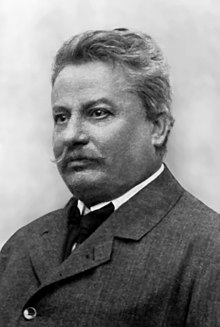Giovanni Pascoli | |
|---|---|
 | |
| Born | 31 December 1855 San Mauro Pascoli, Italy |
| Died | 6 April 1912 (aged 56) Bologna, Italy |
| Resting place | Castelvecchio di Barga |
| Occupation | Poet, scholar. |
| Literary movement | Symbolism, Decadentism |
| Signature | |
Giovanni Placido Agostino Pascoli (Italian: [dʒoˈvanni ˈpaskoli]; 31 December 1855 – 6 April 1912) was an Italian poet, classical scholar and an emblematic figure of Italian literature in the late nineteenth century.[1] Alongside Gabriele D'Annunzio, he was one of the greatest Italian decadent poets.
The first publication of "Il Fanciullino" in 1897 reveals an intimate and introspective understanding of poetic sentiment. It emphasizes the importance of the particular and the everyday, while also evoking a childlike, almost primal dimension. According to Pascoli, only the poet can articulate the 'childishness' inherent in everyone. This notion enables him to assume the somewhat anachronistic role of a poet-vate and to reaffirm poetry's moral (particularly its consolatory) and civic value.
Although he did not actively participate in any literary movement of the time nor show any particular inclination towards contemporary European poetry (unlike Gabriele D'Annunzio), he manifested predominantly spiritualistic and symbolistic tendencies in his production, typical of the decadentist culture of the end of the century, marked by the progressive fading away of positivism.
Overall, his work is characterized by a constant tension between the classical tradition inherited from his teacher, Giosuè Carducci, and emerging decadent themes. Understanding the true meaning of his most significant works is challenging without considering the painful and tormented biographical and psychological elements he obsessively restructured throughout his life, forming the foundational semantic system of his poetic and artistic world.
- ^ "Giovanni Pascoll, Poet, Dead". The New York Times. 7 April 1912. p. 15. Retrieved 22 March 2022.